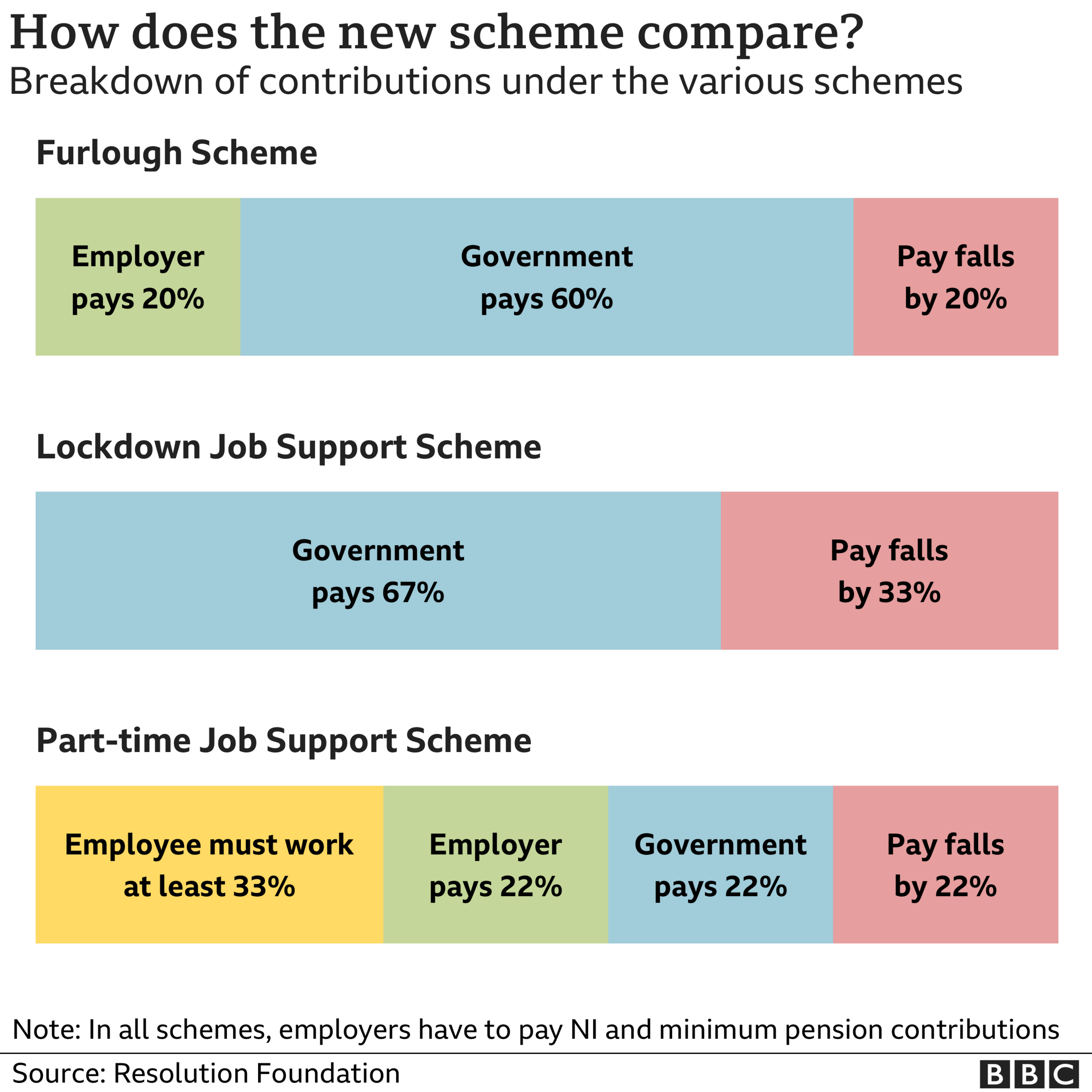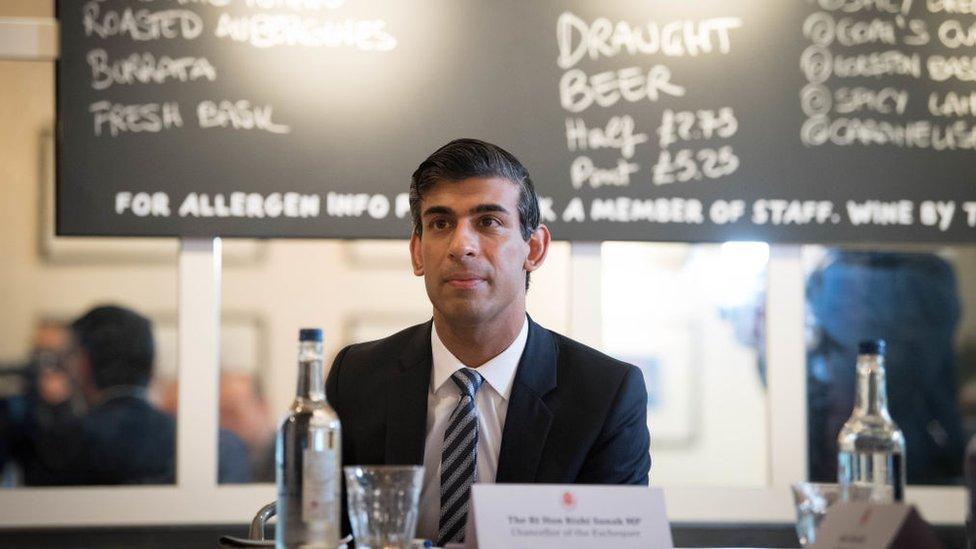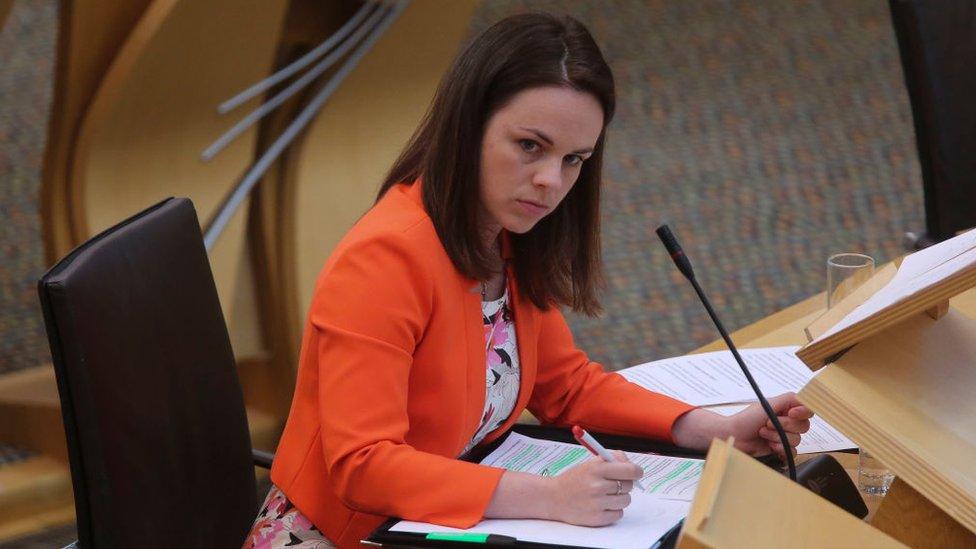How will the new jobs support plan work in Scotland?
- Published

Chancellor Rishi Sunak has unveiled increased support for jobs and workers hit by Covid restrictions. Which parts of his announcement apply in Scotland, and will the Scottish government be seeing extra funding for its own schemes?

At a third attempt, Rishi Sunak has arrived at a Winter Economic Plan that should keep a lot of businesses and jobs financially warm enough to survive.
The first incarnation hadn't reckoned on tightening restrictions, particularly for the hospitality sector. It assumed that November would bring a transition phase back to employers taking the strain for the pay bill of their workforces.
The virus, business and political pressure changed that radically - first with a big adjustment for businesses forced to close under government rules, and now with a radical revamp.
The easy bit to explain is that the Self Employed Income Support Scheme was meant to bring in 20% of past years' profits. That will now be 40%. That applies across the UK.
Likewise across the UK, the Job Support Scheme, for companies that are allowed to remain open, will no longer require a worker to do at least a third of normally contracted hours. That comes down to a fifth - so it could be one day a week.
Those worked hours are paid by the employer. But for the unworked hours, the UK government has stepped up its funding, requiring the employer to contribute 5%. Previously, that share was a third of unworked hours.
As a result, every worker on the scheme should earn at least 73% of normal earnings.

Then there is a grant scheme for hospitality and leisure firms, and that's where it becomes a lot more complex. The system announced by Rishi Sunak applies to England - but not the devolved administrations.
When new spending is announced for England in devolved areas, convention tells the Treasury to give set shares (determined by our old friend, the Barnett formula) to Holyrood, Cardiff Bay and Stormont.
That's normal practice. But these are not normal times. The extra funding for English business grants announced by Rishi Sunak today have no total cost attached to them. He's doing "whatever it takes", and just keeps on borrowing - as only he can.
So it's hard to know how much should be allocated to devolved administrations. And when asked, the Treasury has told the Scottish government that it should fund its own grants through the £700m extra funding announced two weeks ago.
That took the total uplift in Scottish government budget to £7.2 billion since the financial year began, the bulk of that to fund extra NHS costs, testing, tracing, protective equipment, business grants and subsidies for bus and rail.

Rishi Sunak says even firms that can stay open are facing "profound economic uncertainty"
The UK government says that should be plenty for the Scottish government to do what it needs to do.
But recent allocations, including the £700m, give no indication how they were calculated in terms of English spending. But it's a fair guess that it didn't include the grants being announced today, because back then, there was a much less generous Winter Economic Plan.
The problem for the Scottish government is not knowing how much is being allocated, and what period it's intended to cover. Without that, how can Scotland's finance secretary, Kate Forbes, budget for a grants scheme?
And that's why she's sounding off in response.
"The Chancellor has written a blank cheque for business support grants in England," she says, "but is refusing to do the same for Scotland. That is an unacceptable and unsustainable position and once again underlines the urgent case for Scotland having control of its own finances.
"We are being kept in the dark on future funding and denied the ability to borrow if we need to - and it is utterly wrong for Scottish business to not have the same level of certainty on financial support that is available to businesses in England."

Kate Forbes says the UK government's position is "unacceptable and unsustainable"
This adds to the frustration over Treasury budgeting. Mr Sunak has postponed his autumn budget for 2021-22 until next year, leaving devolved administrations in the dark.
A light will be shone towards the end of November: we've been told today that a one-year spending review will be published, setting out what Whitehall departments will be able to spend, and the block grants available to devolved administrations.
But there are at least two problems with that from the St Andrew's House perspective; officials have been told that it won't include the costs of Covid, which will continue to be very high into next financial year, and which are very hard to estimate - and nor will it include tax levels.
That leaves Ms Forbes guessing on the levels of income tax for the rest of the UK, and National Insurance for the whole UK. Trickier still, she's also unable to plan for a continued business rates holiday, if that's judged to be a continuing priority for hospitality, retail, leisure, tourism and aviation.
Only if the Treasury funds that for England will that be affordable in Scotland, and Rishi Sunak won't say if that's his choice until it's far too late for the Scottish budget process.
The UK government's position was clarified in an interview on Friday on the BBC's Good Morning Scotland programme. Steven Barclay, the chief secretary to the Treasury, said funds linked to the English business grants would be made available through the Barnett Formula.


- Published22 October 2020
